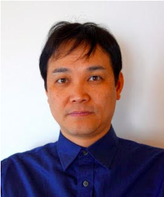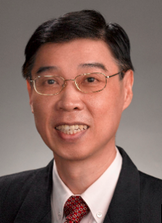|
1. 講者:Hiroaki Ogata 教授
Title of talk: Pushing Forward to Data and Evidence Informed Education and Learning for a Post Covid-19 Era. Abstract: We all experienced and witnessed some big changes in education during Covid-19 since January 2020. In this talk, I will summarize what we learned from the emergency remote teaching during Covid-19 and what we should take out from our experiences for the next new normal in a post Covid-19 Era. In Particular, I will explain how it is very important to capture and analyze the teaching and learning process data, and to find and share the evidences in the nation-wide for a Post Covid-19 Era. Also, it is crucial to foster the self-direction skill of students by using their own learning data for the next new normal era. 講者簡介: Hiroaki Ogata教授任職於日本京都大學(Kyoto University)學習與教育科技研究部、資訊學研究所,專長為資訊技術、學習分析與教育數據科學於教育情境的應用,包括無所不在的行動學習、電腦輔助合作學習、電腦輔助社交網絡等,近年並主持數個大型國家級計畫。 Bio: Hiroaki Ogata is a Professor at the Academic Center for Computing and Media Studies, and the Graduate School of Informatics, Kyoto University, Japan. His current research focuses on Educational Data Science and Data and Evidence-Informed Learning and Education. He has published more than 500 peer-reviewed papers including SSCI Journals, international conferences and book chapters. He received several Best Paper Awards and gave keynote lectures in several countries. He was an editorial board member of IEEE Transactions on Learning Technologies, RPTEL, IJCSCL, IJAIED and SLE. |
Vertical Divider
|
2. 講者:Chee Kit Looi 教授
Title of talk: Needs-driven Innovation: What Covid-19 Tells Us about Digital Transformation in Learning. Abstract: During periods when the Covid 19 lockdowns and disruptions have affected schools and universities round the world, various practices of online learning or blended learning have emerged on the scene to ensure that learning continues uninterrupted. The lockdowns in schools and universities have necessitated emergency responses in the quick adoption of online and blended learning. Practices have quickly emerged such as live hybrid learning in which instructors become TV show hosts, teaching students in-person in the classroom as well as students watching the lecture live online. More opportunities arise to bring about educational change or paradigm shifts that were once out of reach. Some universities have used the pandemic as an opportunity to re-define the intent and curricula of their undergraduate education. Indeed, needs-driven practices implemented at a rapid pace and large scale brought about unprecedented digital transformations in learning. Research has developed new salient understandings of digital learning, such as the sharpening of the digital divide during Covid-19, and issues of equity, self-regulation, well-being and mental health. Reflecting on these understandings and varied practices, we discuss an aspirational future for innovations in the digital transformation of education. 講者簡介: Chee Kit Looi教授任職於新加坡南洋理工大學(Nanyang Technological University),目前為國家教育學院學習科學實驗室的負責人,專長為行動學習、無縫式學習、科技輔助創新學習、行動科技促進中小學教育等,專門為亞大地區推動具國際影響力的高等教育政策,並為全球華人計算機教育學會(Global Chinese Society for Computers in Education, GCSCE)前任理事長。 Bio: Chee-Kit LOOI is Professor of Education at the National Institute of Education (NIE), Nanyang Technological University (NTU), Singapore. He is currently the Co-Director of the Centre for Research and Development in Learning at NTU. He was the founding Head of the Learning Sciences Lab, the first research centre devoted to the study of the sciences of learning in the Asia-Pacific region. His research interests are in the areas of computer-supported collaborative learning, seamless learning and computational thinking. His research on seamless mobile learning has created a model of 1:1 computing, and transformed the curricula of science in a primary school in Singapore so that they can harness the affordances of mobile devices for inquiry learning. This research is remarkable in terms of reaching the stage of achieving sustainability and scalability. Chee-Kit is a Committee Member of the Academic Committee of the Education Informatization Strategy Research Base (Beijing), Ministry of Education, China. He is also a member of the International Scientific Advisory Board (SAB) of the national doctoral UPGRADE programme in Sweden. He was the past President of the Global Chinese Society for Computers in Education. |
|
3. 講者:郭伯臣司長
講題 : 台灣中小學數位學習的過去、現在與未來 演講摘要: 本演講主要介紹有關台灣中小學數位學習的近20年來的演進及教育部未來的規劃,內容包含簡介軟硬體及網路的基礎建設的發展,探討教育部過去所推動大型資訊融入教學計畫及近年來基礎前瞻建設計畫中數位學習計畫所帶來的影響;此外,由於人工智慧在教育領域應用成長與疫情迫使大量師生進行遠距教學,對台灣的數位學習也造成重大的改變,為了因應這些變化,因此教育部數位學習政策也進行大幅度的調整,在最後也會說明我國中小學數位學習的未來規劃。 講者簡介: 郭伯臣教授現職為中華民國教育部資訊及教育科技司司長,同時也是國立臺中教育大學教育資訊與測驗統計研究所特聘教授,專長為教育統計、電腦適性測驗、試題反應、機器學習與資料探勘。2020年COVID-19疫情爆發後,教育部推動「中小學生數位學習中程計畫」,強調教師善用科技培育學生自主學習的能力,而郭司長主持之「科技輔助自主學習推動計畫」,目前全台灣已有三百多所學校加入科技輔助自主學習的行列。 |



